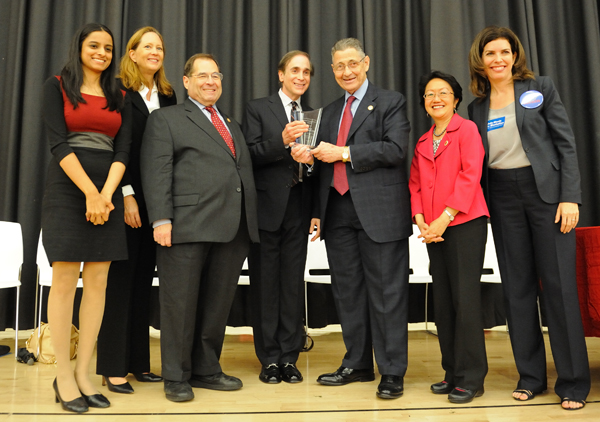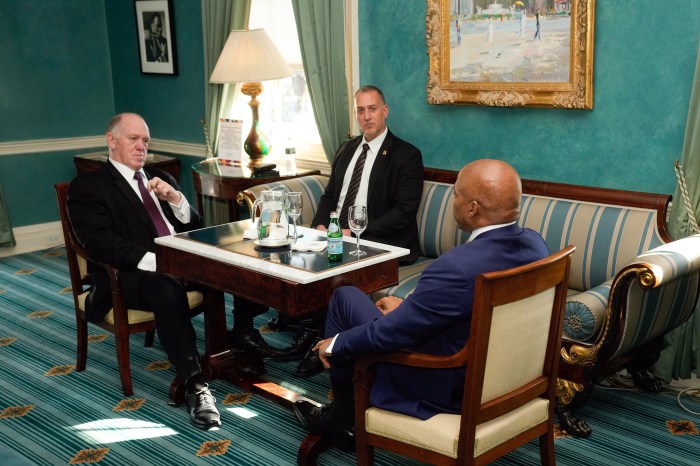
Before his downfall, Sheldon Silver was widely feted by his adoring Downtown constituents grateful for how the former Assembly Speaker wielded his considerable power on their behalf. In 2013, the Gateway Plaza Tenants Association presented him with a lifetime achievement award in a ceremony attended by, from left, 65th Assembly District leader Jenifer Rajkumar, Community Board 1 chairwoman Catherine McVay Hughes, Congressman Jerrold Nadler, G.P.T.A. president Glenn Plaskin, Councilmember Margaret Chin and Consumer Affairs Commissioner Julie Menin.
By Josh Rogers
Sheldon Silver’s conviction this week on federal corruption charges may have ended his 20-term Assembly career, but it won’t erase his Downtown legacy, or the place it has earned him in the hearts of his constituents.
Throughout Silver’s trial, Community Board 1 member Tom Goodkind kept a picture of Silver throwing out the first pitch of a Downtown Little League game as the screen saver on his phone, even though co-workers suggested he remove it.
“It’s hard for Downtown to think of him as anything but our local hero,” Goodkind, a C.P.A. and Battery Park City resident, said on Nov. 30, shortly after Silver’s conviction on all counts. “It’s almost like someone hit me in the gut.”
Silver, described by the gossip site Gawker recently as the “despised New York Assemblyman,” remained popular in Lower Manhattan even after his arrest in January.
As Speaker of the Assembly for two decades, Silver used his power to get things like new schools built in Lower Manhattan, and to protect the homes of people living across from the World Trade Center in the wake of the 9/11 attacks.
“He saved my block after Sept. 11th when the [Port Authority] wanted to do a land grab,” a supporter posted on Facebook after the verdict.
It was actually the Lower Manhattan Development Corp. which suggested razing the block after 9/11, but backed off after pressure from Silver and others.
At the end of 2001, it was Silver who pressed Gov. George Pataki to name then-CB1 chairwoman Madelyn Wils to the L.M.D.C. board, thus insuring a community leader was behind closed doors when decisions on the $2.8 billion fund were made.
Silver also convinced the L.M.D.C. to expand its residential grant program to include Chinatown and the Lower East Side, which were hurt by post-9/11 security measures — particularly the closure of Park Row.
In 2005, he brokered a deal between the city and developer Bruce Ratner to build the Spruce Street School to help reduce the area’s chronic classroom overcrowding.
He used the vote he controlled on the Public Authorities Control Board to press for the extension in 2006 of rent protections at Gateway Plaza, the largest housing complex in Battery Park City.

Silver was surrounded by a less-adoring crowd as he left Downtown’s Federal Court Building after his arraignment on federal corruption charges in January.
Goodkind, a Gateway resident, said he’s not sure what he would reply to someone who says Silver was corrupt and got his just desserts, but he’s confident “the person doesn’t live in our area.”
Downtowners were standing with their long-serving assemblyman against criticism even before his arrest on corruption charges earlier this year.
Silver was honored by Gateway tenants two years ago at a time when he was coming under heavy fire for improperly protecting former Assemblymember Vito Lopez, who was forced to resign amid sexual harassment accusations. His critics saw a connection with Silver’s decision to allow an accused rapist, Michael Boxley, to remain on his staff for years until a second sexual assault accusation surfaced.
But Downtown leaders, women and men, continued to appreciate what he delivered for his district.
“Since Speaker Silver has represented us, he has created four K–8 schools in Community Board 1 and we’re hoping we’ll get another one soon,” Catherine McVay Hughes, chairwoman of CB1, said at the 2013 Gateway Plaza event feting Silver.
Before 9/11, there were often grumblings from Downtown activists upset with Silver, but those dwindled as his Albany clout produced real benefits for a community that was struggling to rebuild.
When he faced his first primary challenge in 22 years, amid the 2008 Boxley scandal, Silver won 68 percent of the vote.
And even Silver’s main primary opponent, Paul Newell, now a Democratic district leader and a likely candidate to succeed him, was careful not to criticize Silver directly in a prepared statement issued immediately after the verdict.
He called it “a sad day for Lower Manhattan,” but added, “no court will end Albany’s culture of corruption and cronyism.”
The jury this week found that Silver collected nearly $4 million in legal fees in exchange for steering state money toward a particular doctor’s cancer research and helping two real estate firms with legislation.
But prosecutors did not charge Silver with any crimes connected to his local work, which included highly praised task forces focused on issues such as school overcrowding and the safety of the troubled demolitions of the 9/11-damaged buildings Deutsche Bank and Fiterman Hall.
The ongoing school task force has been the driving force behind the creation of much-needed new schools Downtown, which is the fastest growing part of the city.
Silver was forced to give up the powerful speaker’s post after his arrest at the beginning of the year, but city Dept. of Education officials continued to attend task-force meetings. Whether they will now that his conviction effectively removes him from the Assembly altogether remains to be seen.
Goodkind said it would take a generation for another Downtowner to match Silver’s level of influence.
It may never happen again.
The former speaker’s downfall shocked Downtowners and took many by surprise — not least Silver, himself.
After the current Gateway Plaza rent deal was negotiated, he said he had no doubt he’d be still speaker in 2020 at age 76, when the agreement would need be extended again.
“There’s no question about that,” he said at the time.





































